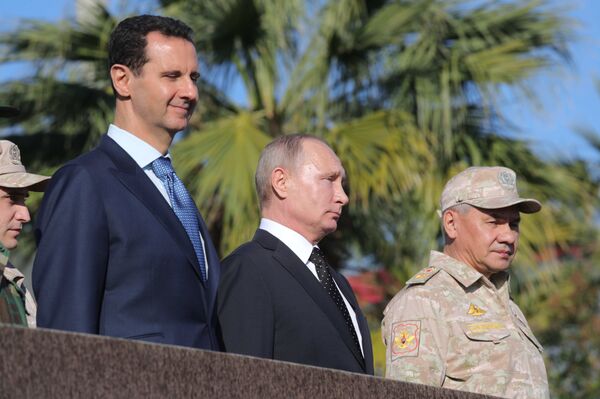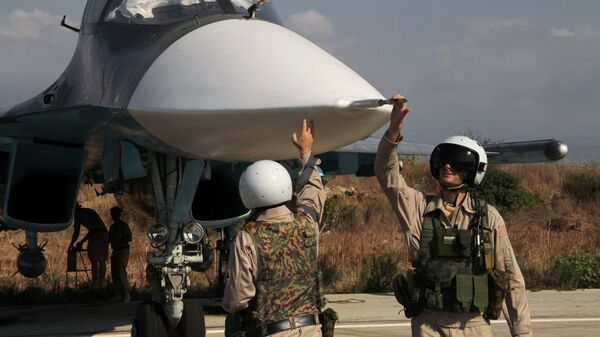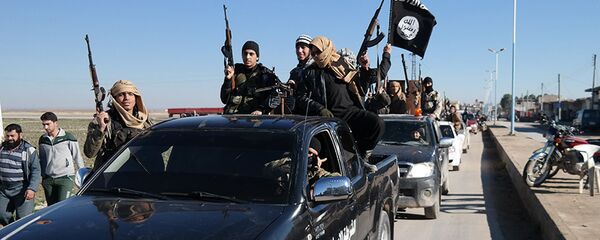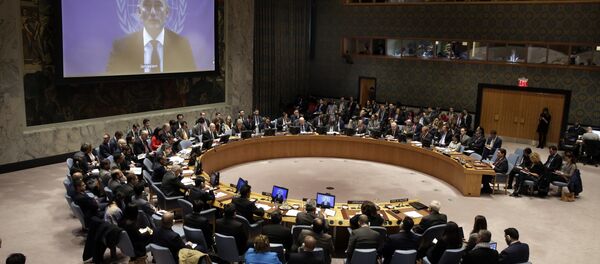President Vladimir Putin's decision to withdraw troops from Syria following the elimination of major hotbeds of Daesh (ISIS/ISIL) in the country can become a new response model to global crises, Col. Gen. Branko Krga, former commander of the General Staff of the Armed Forces of Yugoslavia, and then Serbia and Montenegro (2002-2005), told Sputnik Serbia.
"When certain tasks are fulfilled a [foreign] army must pull out [of the country] and allow local politicians and generals to solve domestic issues themselves," Col. Gen. Krga, who teaches at the Belgrade Academy of Diplomacy and Security, pointed out. "The withdrawal of troops indicates that the peak of crisis has passed, in this particular case — Daesh is defeated. Anyone who advocates a peaceful resolution for Syria must support Moscow's decision."
Commenting on the US' apparent intention to maintain a military presence in the country, the colonel general suggested that Damascus "would hardly praise" the move given the fact that Washington has long been supporting forces struggling against the Syrian legitimate government.
He expressed concerns regarding potential US operations on the ground: "It is impossible to predict what [these activities] will be aimed at," Col. Gen. Krga noted. "However, the US behavior is not surprising: [the Americans] want to be present in this volatile region, because there are many problems [there] that can become relevant again."
"Egypt is one of the most important centers of the Islamic world," the academic noted. "This is a new interesting phenomenon: over the past few months, Putin has communicated with the representatives of four important centers in the region — Egypt, Saudi Arabia, Iraq and Turkey."
According to Col. Gen. Krga, the Russians have always exercised a correct approach toward Muslim nations, which could be explained by the fact that the country has its own predominantly Muslim regions like Ingushetia, Dagestan and Chechnya.
"This is evidence of Russia's strengthening influence both in the Middle East and globally," the colonel general noted, referring to the Russian president's tour.
On December 11, President Putin announced that Russia would pull out of Syria following the successful completion of the aerial campaign in the country. The Russian president specified that the bases in Tartus and Hmeymim, as well as the center for Syrian reconciliation, would continue to operate.

'Palestinians and Israelis Need to Meet at the Negotiating Table'
When asked about the potential consequences of US President Donald Trump's recognition of Jerusalem as the capital of Israel, Krga expressed hope that the Palestinians and the Israelis would not escalate the simmering conflict and meet instead at the negotiating table.
"A new war will not benefit anyone," the colonel general warned, in an apparent reference to the calls for a new intifada on the part of Hamas, a Palestinian Islamist organization.
Krga recalled a conversation with Israeli representatives concerning the Kosovo issue. When the colonel general suggested that Serbia would seek to solve the matter in the near future his interlocutor responded that "this was not a good idea, and that [Belgrade] must wait until the power of Serbia reaches its peak, and then solve the problem."
"This is [Israel's] philosophy and in their relations with the Palestinians — they are waiting for the right moment in international relations to use it for their advantage," Col. Gen. Krga explained. "From the point of view of national interests, this is a good philosophy, but the question is whether this assessment of the situation in international relations would be enough realistic."
Earlier on December 6, US President Trump recognized Jerusalem as the capital of Israel and ordered the State Department to move the US Embassy from Tel Aviv to the city. Trump's move has prompted fears that after the defeat of Daesh the region may again be engulfed by a major conflict. On December 12 Hamas declared the beginning of a third intifada, which followed tense clashes between the Palestinians and Israeli police in the West Bank, the Gaza Strip and Jerusalem.
On December 19, Russian Foreign Minister Sergei Lavrov stated at a meeting with Nabil Shaath, a Palestinian presidential adviser on foreign policy issues and international relations, that Russia is concerned about the situation in Jerusalem and is calling upon the parties involved to start "direct talks, in order to find a solution acceptable to all and based on the well-known UN decisions."
"At this stage, we are rather concerned about the situation regarding Jerusalem…. We will continue doing everything necessary to return the situation to a constructive direction which would promote the beginning of talks," the Russian foreign minister stressed.
The views and opinions expressed by Col. Gen. Branko Krga are those of the speaker and do not necessarily reflect those of Sputnik.





